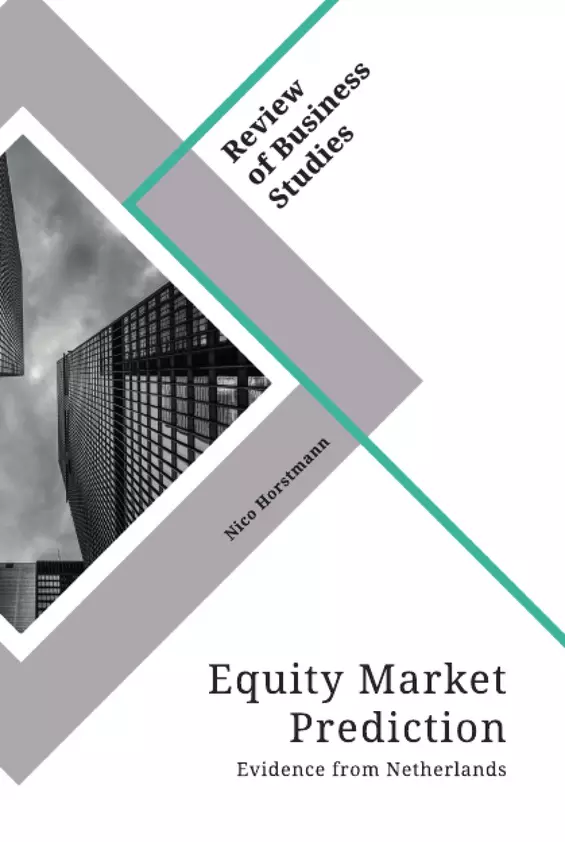The focus of this bachelor thesis is the equity market of the Netherlands. The Amsterdam Stock Exchange is one of the oldest or even the oldest stock exchange of the world. Several interesting companies like Adyen (fintech company) and ASML (semiconductor company) are listed at the Netherlands market. However, this thesis is not about predicting individual stock returns, but about predicting the Netherlands stock market in general, and therefore, a broad stock index (the Netherlands-Datastream Market) is investigated, that contains (nearly) every stock of the Netherlands.
Equity Market Prediction is an quite interesting topic for investment bankers and the academia. It plays an important role in topics like asset allocation, asset pricing, risk management and capital budgeting. Being able to predict the capital markets would result in a huge gain for investors. Even companies may benefit from equity market prediction, because they could time the market by deciding for example the optimal time of an initial public offering (IPO) or pricing this IPO correctly without leaving money on the table. Therefore, this bachelor thesis examines different predictor variables, that are grouped into market valuation, trend, sentiment, and macroeconomic (macro) variables.
Predictor variables are variables that are said to be able to predict the equity market. To test the predictability of these predictors this thesis runs several in-sample and out-of-sample prediction trials with a defined regression framework. In-sample, both univariate as well as multivariate regressions are carried out. Out-of-sample, the predictive power of each predictor is tested stand-alone and compared to a simple benchmark model. In the end a trading strategy resulting from these return predictions may be evaluated.
Inhaltsverzeichnis (Table of Contents)
- Introduction
- Literature review and variable motivation
- Literature review
- Variable motivation
- Data and summary statistics
- Data
- Summary Statistics
- Methodology
- Predictive regression framework (In-sample)
- Out-of-sample methodology
- Econometric specification
- Forecast evaluation
- Empirical Analysis
- In-sample return prediction
- Univariate regression results
- General analysis
- Regression results with market valuation variables
- Regression results with trend variables
- Regression results with the sentiment variable
- Regression results with macro variables
- Multivariate regression results
- Bivariate regression results with market valuation variables
- Bivariate regression results with trend variables
- Bivariate regression results with sentiment variables
- Bivariate regression results with macro variables
- Univariate regression results
- Out-of-sample return prediction
- In-sample return prediction
- Conclusion
Zielsetzung und Themenschwerpunkte (Objectives and Key Themes)
This thesis explores the predictability of the Dutch equity market by examining various predictors categorized as market valuation, trend, sentiment, and macroeconomic factors. The study aims to contribute to the international debate on stock return predictability.- Predictability of the Dutch equity market
- Analysis of various predictors for stock return
- Categorization of predictors into market valuation, trend, sentiment, and macroeconomic factors
- Assessment of the predictive power of individual and combined predictors
- Contribution to the international debate on stock return predictability
Zusammenfassung der Kapitel (Chapter Summaries)
- Introduction: This chapter introduces the topic of equity market predictability and highlights the importance of the study in contributing to the existing literature. It outlines the research questions and the overall structure of the thesis.
- Literature review and variable motivation: This chapter provides a comprehensive review of the existing literature on stock return predictability. It discusses various predictors and their historical relevance in explaining stock market behavior. The chapter also motivates the selection of variables used in the study, outlining their theoretical underpinnings and potential predictive power.
- Data and summary statistics: This chapter describes the data used in the analysis, including the sources, time period, and specific variables employed. It provides a detailed overview of the data characteristics and presents summary statistics for each variable.
- Methodology: This chapter outlines the methodological framework used for analyzing the data. It discusses the predictive regression framework, both in-sample and out-of-sample, explaining the econometric specifications and forecast evaluation techniques utilized.
- Empirical Analysis: This chapter presents the results of the empirical analysis, focusing on both in-sample and out-of-sample return prediction. It examines the predictive power of individual and combined variables across different forecasting horizons, highlighting key findings and insights.
Schlüsselwörter (Keywords)
The core focus of this thesis lies in exploring the predictability of the Dutch equity market. It examines various predictors, categorized into market valuation, trend, sentiment, and macroeconomic factors, in order to gain insights into the factors that drive stock returns. The study utilizes both in-sample and out-of-sample methodologies to assess the predictive power of these variables, ultimately contributing to the ongoing debate on stock return predictability. Key terms include: equity market prediction, stock return predictability, market valuation, trend, sentiment, macroeconomic factors, in-sample analysis, out-of-sample analysis, Netherlands.Frequently Asked Questions
Can the Dutch stock market be predicted?
The thesis examines various variables to test predictability, showing that certain market valuation and macroeconomic factors can offer insights into future returns.
What are the main categories of predictor variables?
Predictors are grouped into market valuation (e.g., P/E ratios), trend variables, sentiment indicators, and macroeconomic variables.
What is the difference between in-sample and out-of-sample testing?
In-sample tests use historical data to fit a model, while out-of-sample tests evaluate how well the model predicts new, unseen data compared to a benchmark.
Why is the Amsterdam Stock Exchange significant?
It is considered one of the oldest stock exchanges in the world and hosts major international companies like ASML and Adyen.
How can companies benefit from equity market prediction?
Companies can use predictions to time their initial public offerings (IPOs) or manage their capital budgeting and risk more effectively.
- Quote paper
- Nico Horstmann (Author), 2021, Equity Market Prediction. Evidence from Netherlands, Munich, GRIN Verlag, https://www.grin.com/document/1128787



